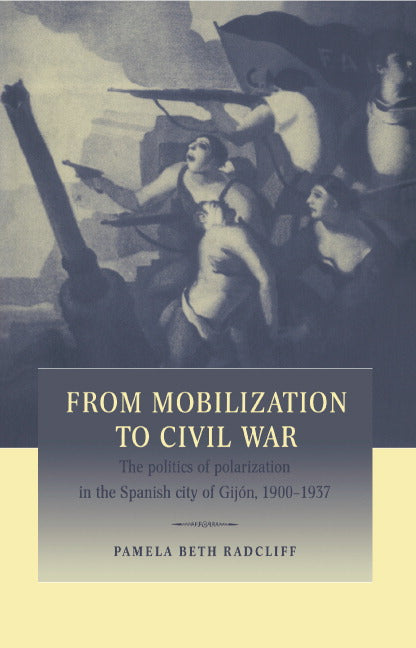Freshly Printed - allow 8 days lead
Couldn't load pickup availability
From Mobilization to Civil War
The Politics of Polarization in the Spanish City of Gijón, 1900–1937
A local study of the origins of the Spanish Civil War at 'grass roots' level.
Pamela Beth Radcliff (Author)
9780521562133, Cambridge University Press
Hardback, published 10 February 1997
376 pages, 6 maps
22.9 x 15.2 x 2.5 cm, 0.72 kg
'… highly challenging and provocative as well as controversial … This is, without doubt, a convincing and illuminating analysis of popular mobilization, social struggle, and conflict, evolving from the initial consumer and food riots to more organized forms of collective action in a society in transition from elite to mass politics.' Historical Journal
This is a social history of political polarisation as it evolved in one city over three and a half decades before the Spanish Civil War. As such it is a book about the long-term origins of the War as seen 'from below'. More broadly it is an analysis of the evolution of political culture during the transition from elite to mass politics. The book focuses on the interplay between the three main forces that competed for political control: the conservative monarchist/Catholics, the democratic republicans, and the revolutionary trade movement. It is different from other Civil War studies, in trying to understand the relationship between organised political forces and the 'masses' they sought to reach. In doing so it reveals a rich canvas of participants and activities, from trade unions and strikes to female consumer riots.
Introduction
1. A turning point: the city in 1900
Part I. Patterns of Life in Working-Class Gijón: 2. The structural context: economy, demography and urban space, 1900–1936
3. Culture and community in working-class Gijón
Part II. Institutional Forces of Opposition: Republicans and Anarchosyndicalists: 4. The republican parties and municipal politics, 1900–1930
5. The republicans in power: municipal politics, 1931–1936
6. The trade union movement, 1900–1936
Part III. Defining an Oppositional Culture: The Struggle over the Public Sphere: 7. Republican culture: a nation of citizens
8. Labour movement culture: 'the brotherhood of workers'
Part IV. The Urban Battlefield: Conflict and Collective Action, 1901–1936: 9. Conflict and collective action, 1900–1923
10. Conflict and collective action during the Republic, 1931–1936
Conclusion.
Subject Areas: 20th century history: c 1900 to c 2000 [HBLW], European history [HBJD]


